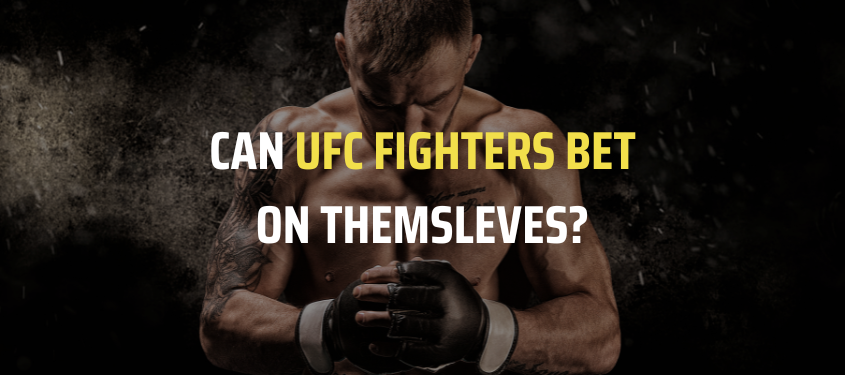In the thrilling world of mixed martial arts, UFC fighters often face intense pressure both inside and outside the octagon. One question that frequently arises is, “Can UFC fighters bet on themselves?” This intriguing topic opens up discussions about ethics, legality, and the potential risks involved in self-betting. In this article, I will explore the rules surrounding betting, the implications of fighters wagering on their own success, and the broader impact on the sport. Let’s dive into the details!

The Legal Landscape of Betting in the UFC
Understanding Betting Regulations
Before addressing whether UFC fighters can bet on themselves, it’s essential to understand the legal landscape surrounding sports betting. In the United States, the legalization of sports betting has evolved significantly. The Supreme Court’s decision in 2018 allowed states to regulate sports betting, leading to a boom in legal sportsbooks across the country.
However, the UFC maintains strict regulations regarding betting, particularly concerning fighters. The organization aims to uphold the integrity of the sport, and any form of gambling that could compromise it is heavily scrutinized. The UFC has a comprehensive policy that prohibits fighters from betting on any fights, including their own.
Why Can’t Fighters Bet on Themselves?
The primary reason UFC fighters are prohibited from betting on themselves is to prevent any potential conflicts of interest or corruption. If a fighter were allowed to bet on their own victory, it could lead to scenarios where they might not perform to the best of their abilities, especially if they had financial incentives to lose.
Moreover, the UFC is committed to maintaining a level playing field, ensuring that all fighters compete fairly and without outside influences. The potential for match-fixing or other unethical behavior is a significant concern that the organization actively seeks to avoid.

The Ethics of Self-Betting in Sports
The Moral Dilemma
The question of whether fighters should be allowed to bet on themselves raises ethical concerns. On one hand, it could be argued that betting on oneself demonstrates confidence and commitment to victory. On the other hand, it opens the door to potential exploitation and moral hazards.
Fighters invest years of training, dedication, and hard work to reach the UFC. Betting on themselves could be seen as a reward for their efforts, yet it also introduces risks that could undermine the sport’s integrity. This duality creates a complex moral dilemma that is worth exploring.
Real-Life Examples
While there have been instances in various sports where athletes have faced scrutiny for betting, the UFC has largely avoided such controversies. For example, in 2017, a former UFC fighter was found guilty of betting on his own fight, leading to a suspension and fines. This case highlighted the serious repercussions of violating betting regulations and served as a warning to other fighters.

The Impact of Betting on Fighter Performance
Psychological Effects
Betting can have psychological effects on athletes, influencing their performance and mindset. When fighters place bets on themselves, they may feel increased pressure to win, which could lead to anxiety or stress. This heightened pressure might affect their training, preparation, and overall performance in the octagon.
Conversely, the absence of self-betting may allow fighters to focus solely on their training and strategy without the added burden of financial stakes. This can foster a healthier mindset and contribute to better performance.
Financial Implications
The financial aspect of betting cannot be ignored. Fighters often face financial challenges, especially in the early stages of their careers. The lure of betting on themselves may seem appealing, but it poses significant risks. Losing a bet could compound existing financial struggles, leading to poor decision-making and potentially harmful consequences.
Moreover, the UFC’s payout structure can be complicated, with fighters sometimes receiving a base salary and additional bonuses based on performance. This can create a situation where fighters might feel compelled to take risks, including betting, to secure their financial future.

Alternatives to Self-Betting
Sponsorships and Endorsements
Instead of betting on themselves, fighters can explore sponsorships and endorsements as alternative means to secure financial support. Many fighters have successfully partnered with brands, leveraging their popularity to create lucrative deals. This not only provides financial stability but also enhances their visibility in the sport.
Performance Bonuses
The UFC offers performance bonuses for fighters who deliver exceptional performances. These bonuses can be a significant source of income and serve as an incentive for fighters to perform at their best without the risks associated with betting. Focusing on winning fights and earning bonuses can be a more reliable and ethical approach to financial success in the UFC.

Frequently Asked Questions
Can UFC fighters bet on themselves?
No, UFC fighters are prohibited from betting on themselves or any fights. This rule is in place to maintain the sport’s integrity.
What are the consequences if a fighter bets on themselves?
If a fighter is caught betting on themselves, they may face severe penalties, including fines, suspensions, or even being released from the UFC.
Are there any exceptions to the betting rules?
No, the UFC maintains a strict policy regarding betting, and there are no exceptions for fighters.
Can UFC fighters bet on other fighters?
While fighters can bet on other events, they are discouraged from betting on fights involving their peers to avoid conflicts of interest.
What should fighters do instead of betting on themselves?
Fighters can focus on securing sponsorships, pursuing performance bonuses, and investing in their training and development to enhance their financial stability.

Conclusion
In summary, the question of whether UFC fighters can bet on themselves is a complex one. The UFC’s strict regulations aim to preserve the sport’s integrity and prevent any potential conflicts of interest. While the allure of self-betting may be tempting, the risks and ethical implications far outweigh the benefits.
Fighters are encouraged to seek alternative avenues for financial stability, such as sponsorships and performance bonuses, which allow them to focus on their craft without the added pressure of betting.
As the world of sports betting continues to evolve, it’s essential for fighters and fans alike to stay informed and engaged. If you’re interested in learning more about the intricacies of UFC betting and the implications for fighters, I encourage you to explore further resources and discussions on this topic.


